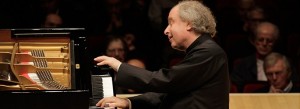After concluding his three-part series of the final sonatas of Haydn, Mozart, Beethoven and Shubert last week (see our review), Sir András Schiff stayed in town to prepare for his conducting debut with the LA Phil. On Oct. 24, Schiff led the LA Phil in two works, the Piano Concerto No. 25 in C major by Mozart, K. 503, which Schiff conducted from the piano, and the Mass in C major, Hob. XXII:9, “Missa in tempore belli” (Mass in Time of War).
Schiff opened the concert with the Mozart. He began by conducting the opening orchestral introduction standing on the side of the piano in front of the orchestra where the podium would normally be. Then right before the piano entrance he swiftly moved to the piano. From then on he alternated between standing up next to the piano and conducting with his left hand while his right hand played. At one point in the third movement he actually stood up and conducted with his left hand while his right hand continued to play.
Schiff displayed not only his legendary pianistic technique and musicianship, but also his ability to conduct. His movements weren’t as polished as a full-time conductor, but it was clear that he knew the music thoroughly, and his almost-constant smiling during both the Mozart and Haydn suggested that he was having the time of his life. Of course, who wouldn’t conducting two such joyous masterpieces?
The Mozart concerto is one of the few for which Mozart didn’t write a cadenza, so Schiff wrote his own brilliant cadenza. And then to the surprise of everyone, Schiff inserted a brief rendition of the French national anthem, La Marseillaise, which was written and performed in 1792 after France declared war on Austria. Although Mozart wrote his concerto in 1786, six years earlier, Haydn wrote his glorious Mass four years later when Europe was still at war and Austria was losing to France. Thus, Schiff’s insertion of La Marseillaise, which evoked smiles from members of the orchestra and some audience members, was very fitting.
For the Haydn Mass, Schiff and the LA Phil were joined by the Los Angeles Master Chorale and four soloists, soprano Anna Lucia Richter, alto Britta Schwarz, tenor Werner Güra and bass Robert Holl. Although the Mass has the traditional sections, with a few exceptions (Benedictus and Agnus Dei) the music for this Mass is uplifting. Haydn was a very religious man, and this Mass is a tribute to the glory of God. It is also a glorious piece of music that Schiff, the Phil and the singers performed in the exalted fashion that it deserves. Schiff beamed the entire time, showing his pleasure at the way the LA Phil played and the Master Chorale and soloists sang and how it sounded in the church of Disney Hall.
Immediately following the Haydn, the stage was reset and the audience was invited to stay for a performance of several lieder by Schubert featuring the four soloists accompanied by Schiff on piano and, for some, some members of the Master Chorale. It was, as Schiff described in his brief introduction — during which he also told the audience that they were lucky to have such a wonderful concert hall in Los Angeles — to be as intimate a performance as was possible in a big concert hall. And the performers didn’t disappoint, especially Robert Hall, who sang Totengräbers Heimweh (the homesick gravedigger) with such conviction and pathos that it was difficult to believe he didn’t really long to die and be buried in the grave he had dug.
Sir Schiff seems to like Los Angeles, and it is apparent from the last two weeks that Los Angeles likes him. Let’s hope he graces us with his playing and conducting again soon.
—Henry Schlinger, Culture Spot LA
For information about upcoming concerts, visit www.laphil.com.






